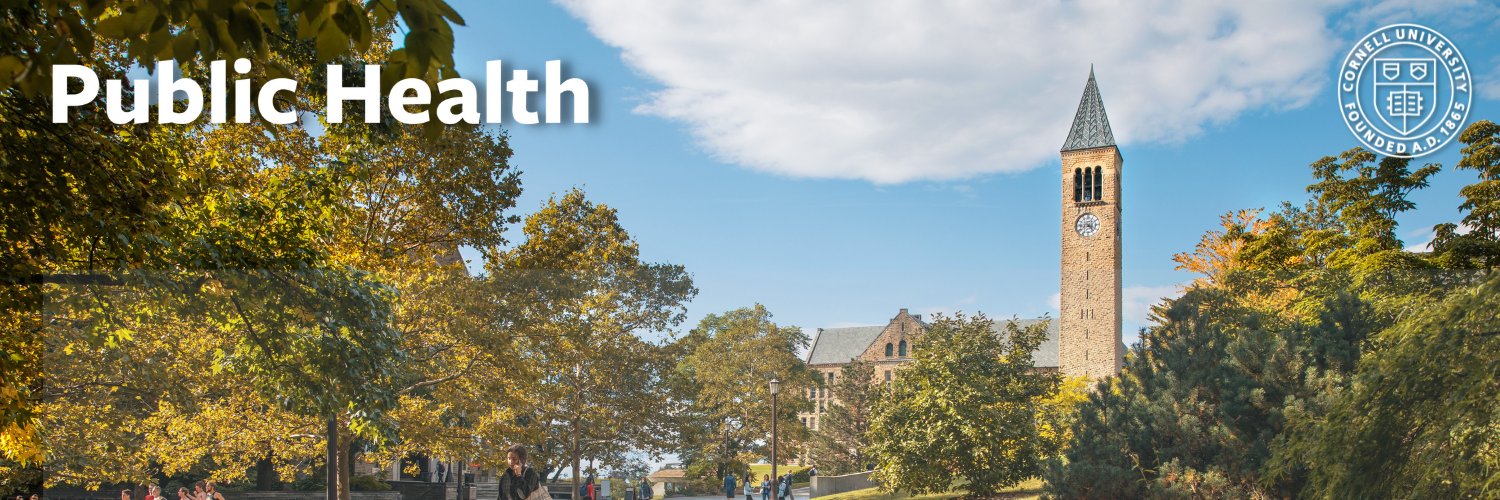
Cornell Public Health
@CornellMPH
A @Cornell community of public health leaders who are inspired, trained, and deployed to ensure the health of people, animals, and the world in which we live.
Sun protection should start at an early age because UV (ultraviolet) exposure adds up over time and increases the risk of developing skin cancer. Learn more about sun safety: cdc.gov/skin-cancer/su…
Mosquitoes can be more than a pest -- they can spread Eastern Equine Encephalitis, West Nile Virus and other disease. Learn about mosquito-borne disease and how to protect yourself. health.ny.gov/diseases/west_…
Calling @Cornell faculty 📢 Today we launch **four** new funding opportunities at Cornell Atkinson to support bold, interdisciplinary work that advances real-world solutions. ℹ️ Explore the funding opportunities: atkinson.cornell.edu/grants/
A new free modeling tool, RuFaS, enables farmers to predict how changes in the ways a dairy farm is managed could impact production costs, resource use & emissions. 📰 Big news: The tool is now available at no cost for open-source collaboration: news.cornell.edu/stories/2025/0…
Great @CornellNews article on this collaborative #moose health research project. For more info and the latest update, visit our Moose Population Health page: bit.ly/3QvGTuZ @cornellvet @wildlifeDZeco @Fuller_Lab @NYSDEC #wildlife #research #TheMoreYouKnow
From deer to moose: Parasites that often use deer as hosts, but rarely lead to illness in them, are much more problematic — and sometimes fatal — in moose, according to @Cornell research. @CornellCALS @cornellvet @CornellGrad @NYSDEC @USFWS @KrishnaWriter news.cornell.edu/stories/2025/0…
Harmful algal blooms have made their unwelcome seasonal return to U.S. lakes and coastal areas, including New York’s Finger Lakes — disrupting recreation and posing health risks for people, animals, and ecosystems. But Cornell scientists have now discovered the toxic bloom’s…
From deer to moose: Parasites that often use deer as hosts, but rarely lead to illness in them, are much more problematic — and sometimes fatal — in moose, according to @Cornell research. @CornellCALS @cornellvet @CornellGrad @NYSDEC @USFWS @KrishnaWriter news.cornell.edu/stories/2025/0…
Avian flu and dairy herds: The impact of highly pathogenic #avian influenza on the poultry industry is well documented. But the health of the dairy industry is also at risk, according to new @cornellvet research. @NatureComms @lreiley news.cornell.edu/stories/2025/0…
To help dog owners protect their pets from toxic algal blooms, @nyseagrant & @cornelldogs has published a newly-revised "Protect Your Dog from Harmful Algae" brochure. hubs.ly/Q03x6R5k0
🥵Heat Advisory is in effect for Tompkins County today, Wednesday 7/16, from 11am - 8pm. Drink plenty of fluids, stay in an air-conditioned room, stay out of the sun, and check up on relatives and neighbors. Heat stroke is an emergency! Call 911.
Applications are now open for our 2026 Postdoctoral Fellowships! Join our cohort of early-career scholars committed to discovery that contributes directly to solving the most pressing problems facing our planet. Apply by 10/20 — and please share widely: atkinson.cornell.edu/cornell-atkins…
July is Minority Mental Health Awareness Month, highlighting the unique mental health concerns & experiences of diverse racial & ethnic groups, acknowledging the impact of systemic inequities & discrimination on their well-being. (1/2)
Heat-related illness can begin suddenly during extreme heat. Be prepared to weather the heat: ✔️ Stay hydrated, but avoid alcohol, caffeine & sugary drinks ✔️ Take breaks from the outdoors esp 11a-4p ✔️ Make sure windows can open &/or AC is working Tips: health.ny.gov/environmental/…
Special mosquito-control districts in Florida outperform county programs but they serve wealthier areas, creating inequities in coverage. A Cornell study highlights gaps in #mosquito control as state and federal public health funding decline. Learn more: news.cornell.edu/stories/2025/0…
Last month, Dr. Laura Goodman’s lab shared groundbreaking research with @cornellvet alumni during an engaging & interactive presentation. The session highlighted two critical areas of study: the risks associated with raw food diets & advances in detecting tick-borne diseases.
🎥 Dr. Katie Fiorella, environmental scientist & epidemiologist at @cornellmph + @cornellvet, shares the contributions of the aquatic ecosystem to food access and human nutrition in our latest #OneHealth Around the World episode. @ecornell_online
Interested in pursuing a Master of Public Health (MPH) degree? Join us next Thursday, July 17th from 9am-5pm ET at the @TIPHtweets Virtual Fair to learn more about our program and our four concentration areas! Register Today: careereco.com/events/tiph-Ju…

The Ruminant Farm Systems (RuFaS) modeling tool, developed by Cornell researchers and collaborators across academia, industry, government and nonprofits, is available at no cost for open-source collaboration. Cornell’s Department of Animal Science in @CornellCALS has led…
Researchers at @cornellvet are pursuing several projects to protect animal and public health against highly pathogenic avian influenza (HPAI). Learn more about the work combatting HPAI: doi.org/10.2460/ajvr.2… Check out the HPAI resource center: bit.ly/4kwghZD

The Whittaker Lab announced the new Cornell Feline Health Center Consortium at the NYC Virus Hunters Research Symposium. They used real-world data from an H5N1-infected skunk to highlight the importance of virus surveillance & how it can support both animal and public health.